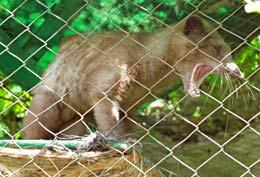A pricey harvest from animal abuse

Animal rights group People for the Ethical Treatment of Animals (PETA) is calling for a boycott of one of Asia’s most popular and pricey commodity - Kopi Luwak, or civet coffee - saying that animal abuse was part and parcel of the production of the coffee beans.
PETA said that most of the civets producing the famous coffee were confined to cages and subjected to cruel, unnatural treatment.
A PETA investigator visited several civet coffee farms and villages in Indonesia and the Philippines, two of the world’s top producers of kopi luwak. Undercover footage from these farms—some of which advertise their coffee as “wild-sourced”—shows sick civets suffering from infections and exhibiting signs of zoochosis, a condition in which captive animals constantly spin, pace their cages, and bob their heads in frantic displays of frustration.
“Purchasing a product that’s the direct result of animal abuse supports the abuse, which is why PETA is asking consumers to boycott civet coffee,” PETA vice president of international operations Jason Baker said.
He said that the abuse was in fact worse than drinking a beverage derived from beans pulled from animal excrement.
“Although unappetizing, drinking coffee made from beans that were plucked from feces isn’t the most revolting aspect of civet coffee.”
The animal rights group also found that civets were generally caged for a maximum of three years before being released back into the wild, where some of them failed to readapt and died.
Civet coffee beans, which unroasted can fetch a price of US$200 per kilogram, used to be produced naturally by wild civets in coffee plantations eating and excreting the beans. After passing through the animal’s digestive tract, it’s said the beans become less acidic and acquire a smooth taste.
“While there may be wild-sourced production out there, we’re having a hard time finding it,” Baker said. “Everyone is claiming to sell wild civet [coffee], but they can’t prove it.”
One of companies PETA visited that misrepresented the source of its product was Che Nung Kopi Luwak, located in Lampung, Sumatra.
PETA alleged that the company had put a wild-sourced label on its packaging, when actually its coffee came from caged civets.
Daryad Hadi, one of owners of Che Nung Kopi Luwak said that PETA had wrongfully accused the company, as it had never labeled any of its products as wild-sourced.
“All civets were taken from the wild, but not the coffee beans,” he said. “I always say to my customers that the civet coffee beans that we produce all come from caged civets, simply because we are trying to control the quality,” Daryad told The Jakarta Post on Friday.
Daryad also rejected PETA’s claim that some of his civets were abused.
“No civets are harmed in our facility. The civets are all given nutritious food, including fruits. We never force them to keep eating coffee cherries. They only eat the cherries after they have eaten proper meals,” he said.
Daryad said that Che Nung farms had around 20 civets that could produce up to 300 kg of coffee beans per month, with around 10 percent of the coffee beans being exported to China.
Meanwhile, Indonesian Coffee Exporters and Industry Association (AEKI) deputy chairman Pranoto Sunarto said almost none of the civet specialty coffee was collected in the wild.
“We couldn’t collect the beans in the wild and process them. We couldn’t guarantee the quality, and it definitely wouldn’t taste as good as what came from the caged civets,” Pranoto said.
In the wild, civets frequently climb trees to reach the coffee berries, but in captivity, they are fed more of the ripe fruit than they would ever eat naturally, leading to nutrient deficiencies. One farmer explained that civets are generally kept caged for a maximum of three years before they’re released back into the wild and that the stress of confinement and lack of nutrition cause them to lose their fur. Another farmer compared civets eating too many coffee berries to humans smoking since the civets’ health deteriorates greatly during captivity because of lack of vitamins and nutrition. The same farmer told PETA’s investigator that some civets don’t survive after they are released back into the wild.
While kopi luwak is often advertised as “wild-sourced,” farmers told the investigator that it would be nearly impossible to produce exclusively wild-sourced civet coffee and that the industry knowingly mislabels coffee from captive animals. At two farms, the investigator was told that businesses didn’t have a problem selling coffee from caged civets with a “100 percent wild-sourced” or similar label. One farmer even gave the investigator a sample of coffee bearing a false label.
Meanwhile, a group of college students in Indonesia said they have produced coffee by imitating the natural fermentation that makes kopi luwak or civet coffee.
“This is a solution for coffee farmers in Lampung who have experienced a decrease in orders [for civet coffee],” Suroyo Roy, a student at Darmajaya Informatics and Business Institute and one of the initiators of the project said.
Roy claimed the artificial process of fermentation and enzyme reaction was the same as happened through digestion. “The taste is the same as coffee beans digested by civets.”
Leave a comment









